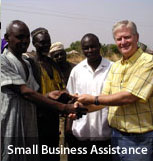Project Profiles
Rwanda Tea Importers
Persistence and a long-term commitment make a difference in Rwanda
“You can’t move 15 million tea bushes. That’s where they are, so that’s where we are,” said Joseph Wertheim, summing up why his Westport, Connecticut-based company, Tea Importers, Inc., has remained a driving force in Rwanda’s tea business since 1975, despite a devastating five-year civil war in the early 1990s. Backed with OPIC support, this small business was for many years the only U.S. investor in Rwanda, one of the poorest countries in the world, with a largely agrarian economy built mainly on coffee and tea exports.
SORWATHE, the Rwandan company in which Tea Importers is the U.S. investor, is the largest and only U.S. privately controlled producer of tea in Rwanda; it has also been acknowledged to be the best run tea plantation and processing facility in the country.
OPIC’s history with Tea Importers stretches back to 1978, when it made a $550,000 loan to SORWATHE to assist in building the tea processing facility and plant 267 hectares (668 acres) of tea. Tea Importers then purchased OPIC insurance, which it has kept active ever since. The loan was repaid in 1990.
During the 1990-1994 civil war, rebels shelled the company’s tea processing factory and looted vehicles, office furniture and computers. OPIC’s payment of four political violence claims for losses totaling nearly $250,000 encouraged Tea Importers to stay and rebuild (read the associated Memorandum of Determinations). Shaken but determined, SORWATHE was the first tea factory to resume production after the war.
As Tea Importers undertook another expansion of its processing facility in 1997, OPIC too showed its staying power and committed an additional $1.2 million in insurance to this important project. SORWATHE purchases tea leaves from about 5,000 small landholders, thus making it a very important source of cash income for the local population. Tea is Rwanda’s second most important export product after coffee, representing about a third of foreign exchange earnings. The SORWATHE factory, which only covers ten percent of Rwanda's plantation area, produces roughly 20 percent of the country's black tea.


